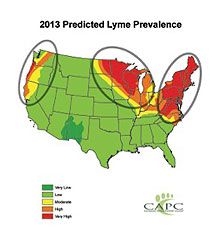Experts predict increased threat of Lyme disease this year
Veterinarians urged to promote parasite prevention to protect pets and people.
The Companion Animal Parasite Council (CAPC) recently released its Lyme disease forecast, predicting that the threat of the tick-borne disease will be extremely high for dogs this year. The forecast—developed with the assistance of statisticians from Clemson University—is based on factors such as temperature, dew point, humidity, precipitation, elevation, forest cover, population density, reported cases of human Lyme disease and deer strikes by car.

According to CAPC, one in 15 dogs test positive for Lyme disease, making the role veterinarians play in preventing the disease all the more crucial. “Because ticks can be carriers of many diseases, including Lyme disease, it is essential that veterinarians remind their clients of the importance of regular visits and monthly parasite prevention,” says Dr. Chris Carpenter, executive director of CAPC.
Here are CAPC’s chief recommendations for pet owners that you can share with your clients:
> Use tick preventives year-round. Due to variations in tick prevalence and seasonality by region, year-round use of topical tick-control products on pets is strongly recommended.
> Eliminate tick-friendly habitats. Control tick—and alternative host—populations by cutting or removing grass, weeds and brush piles between fences, along property lines and near buildings. It’s also helpful to select plants that don’t attract deer.
> Treat the environment. Consider using products such as carbaryl, cyfluthrin, permethrin or s-fenvalerate to help control ticks. If you’re not familiar or comfortable with these products, it may be a good idea to have a licensed exterminator apply these acaracides to your property. But remember: Acaracides should be allowed to dry before animals or humans are allowed back onto the premises.
For more information about tick prevention and control—as well as an interactive map detailing parasite prevalence by state—visit capcvet.org.